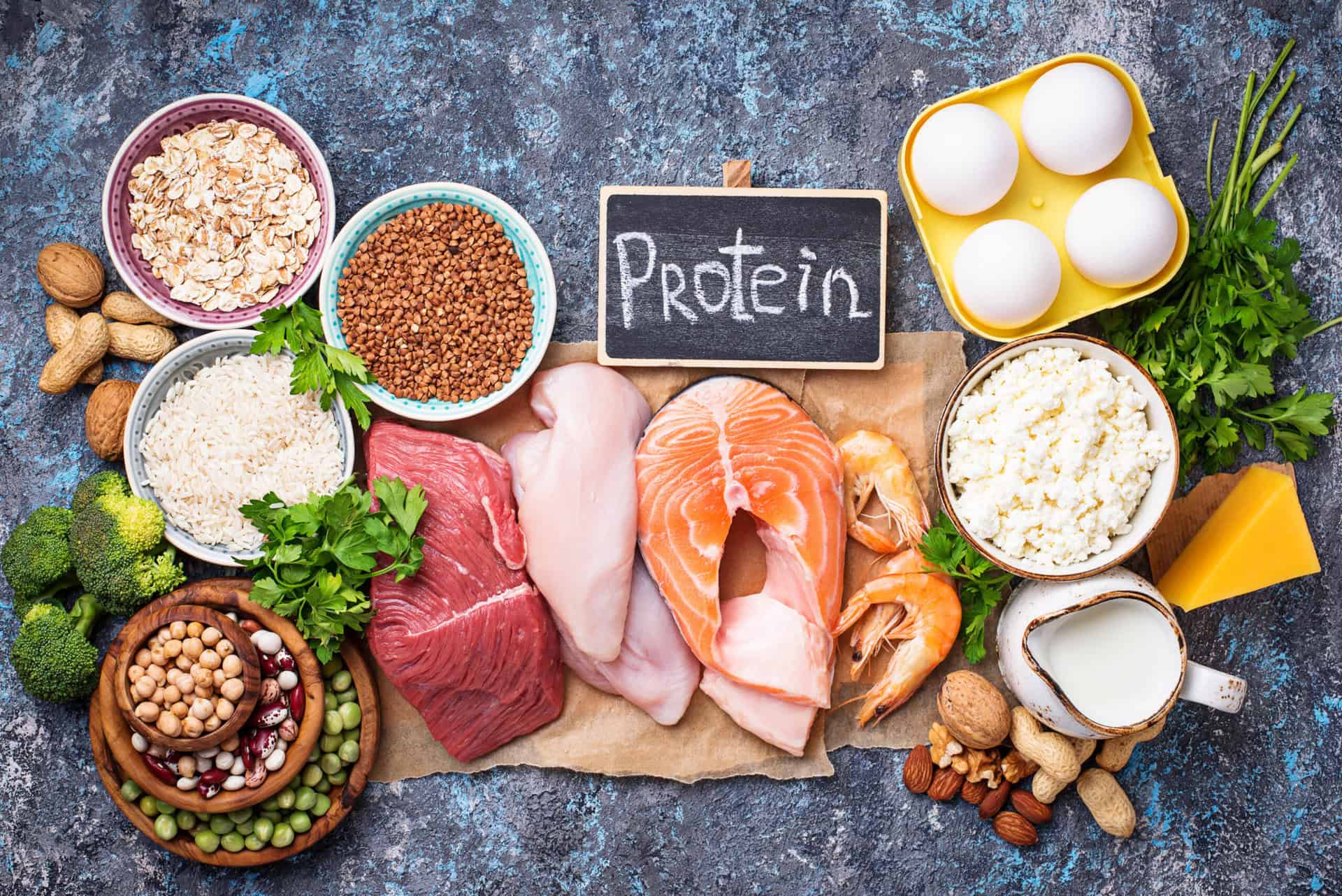Did you know you need different amounts of protein in your diet during different life stages? What you need as an adolescent isn’t the same as a 50-year old, or even an 80-year old. Let’s look at the recommended amounts of protein you need across the lifespan, why it’s important to get enough protein, and what happens when you don’t. But first, what really is protein?
Protein: An Essential Macronutrient
Protein is one of the three essential macronutrients our bodies need in large amounts – right next to carbohydrates and fats. Because the body doesn’t store protein, we need to eat it every day. Protein intake is an essential part of building and repairing tissues, making enzymes and hormones, building and maintaining muscle, repairing cells, and healthy growth and development in early life.
The building blocks of protein are amino acids. There are 20 different types of amino acids that can be combined in various ways to make protein. Of these, nine are considered essential – meaning they cannot be produced by our bodies and must be obtained through our diet. When we eat protein, our body breaks it down into individual amino acids, which are then used to build new proteins. Some commonly known amino acids include leucine, tryptophan, and lysine.
Protein can come from animal or plant sources. Common sources of animal protein include meat, poultry, and fish. Plant protein sources include beans, tofu, tempeh, and certain whole grains. Protein supplements like protein powder also contain high amounts of protein, but whole foods are always the preferred source.
You may be asking yourself which is better – animal or plant based protein? Animal protein contains all the essential amino acids needed by the body. Plus, it’s often well digested. Plant protein has a less optimal distribution profile of amino acids and has lower digestibility. Because of this, high-quality animal protein has a greater ability to enhance muscle synthesis and support lean muscle mass than plant protein.
How Much Protein Do I Need?
Traditionally, the recommended amount of protein was believed to be the same for all healthy adults – 0.8g/day per kilogram of body weight. This is considered the minimum intake to maintain muscular integrity in the body. However, more recent evidence suggests the daily amount of protein needed may increase with age.
Protein Intake By Age
Young Adults
For young, healthy adults the recommendation is at least 0.8g/kg/day. This is significantly less than older adults, who require approximately 70% more than their younger counterparts!
Middle-Aged Adults
Most adults likely need around 1g/kg/day, with an ideal range being between 1.0g to 1.4g/kg/day. Higher protein intake is needed as we age to prevent further protein degradation and reduced muscle protein synthesis often seen from inflammation in chronic diseases. What is interesting is that clinical research is the least robust for those in middle age. A lot of the research studies are in young males and the elderly.
Elderly Adults
Elderly adults need even more protein to maintain muscle and bone health. It’s recommended they consume between 1.2g and 2g/kg/day. Higher protein intake is especially important during periods of physical inactivity when the muscles aren’t working as much as normal, and can be helpful in periods of fracture recovery. Studies have shown that older adults who consumed more protein lost less lean muscle mass than their counterparts eating less protein.
What does the daily protein intake recommendations translate into per meal for elderly adults? Roughly 35g of protein per meal for elderly individuals – about 70% more than the requirements for young adults. This suggests an age-related resistance to dietary protein. Why? Our body’s are less responsive as we age to low doses of amino acids. But this can be overcome with increasing protein intake.
Leucine, an essential amino acid, is a potent muscle synthesis stimulator and plays an important role in older adults. A higher proportion of leucine is needed to build and maintain muscle as we age. Beta-hydroxy- beta-methyl butyrate (B-HMB), an active metabolite of leucine, helps improve the muscle-building process and reduce muscle breakdown. It also helps older adults increase muscle mass, providing further evidence that leucine is an important component for older adults.
While evidence supports increasing protein needs for older adults, health professionals often tout that high-protein diets can worsen kidney function. However, studies have shown that this is not the case in healthy older adults. Instead, kidney problems arise in unhealthy older adults, who are at higher risk of developing kidney insufficiency.
What Happens When You Don’t Get Enough Protein?
It’s estimated that 38% of men and 41% of women don’t get enough protein in their diet. Without enough protein, our muscles don’t function properly. This becomes especially important as we age, since the natural aging process can lead to loss of muscle mass and strength which we’ll talk about next.
What is Sarcopenia?
Sarcopenia is a condition characterized by less than optimal muscle mass and decreased function, primarily affecting older adults. It reduces mobility, decreases quality of life, and can increase the risk of falls.
But don’t we lose some muscle mass as we age? Yes, the muscles undergo significant changes with aging, like a decrease in muscle mass of 3-8% each decade after age 30. But sarcopenia is more than just age-related muscle loss. Studies have shown that other factors play a role in sarcopenia, including obesity and physical inactivity. Additionally, muscle weakness in middle-aged and older adults is correlated to limitations in daily functioning and physical disability which can further decrease muscle mass.
Early detection and proactive management are important to maintain quality of life during the aging process. Eating enough protein and regular physical activity with strength and resistance training go a long way with this. Even a single session of resistance training is associated with a two to threefold increase in muscular protein synthesis.
Sarcopenia and Mortality
Many studies tout the importance of muscular strength and its role in maintaining health as we age. Muscular strength is inversely associated with all-cause and cardiovascular mortality – meaning less strength is associated with higher mortality levels. This is even independent of other commonly thought of cofactors like body fat, cardiorespiratory fitness, and smoking! Studies further show muscular strength being inversely associated with other chronic diseases like stroke, metabolic syndrome, and type 2 diabetes. But, when muscular strength is improved, significant mortality reductions were found!
So what’s the solution? Healthy older adults should eat at least 1g to 1.2g/kg/day, while older adults who are malnourished or at risk of becoming so due to chronic illness should consume between 1.2g to 1.5g/kg/day. This should be combined with daily physical activity, especially resistance training to build muscular strength and minimize sarcopenia.
Another consideration to improve muscle mass and physical fitness during the aging process is probiotics. When the gut microbiota is unbalanced, lower muscle mass and poor physical function often follow. This is seen in older, frail adults who have significantly decreased levels of certain probiotic strains. But, Lactobacillus and Bifidobacterium help restore age related muscle loss.
Ways to improve the gut microbiota include:
- Taking a probiotic supplement with Lactobacillus, Bifidobacterium, and Saccharomyces strains like this one
- Eating fermented foods, yogurt, and kefir
- Supplementing with prebiotics or inulin
Still Struggling To Eat Enough Protein? Functional Medicine Can Help
Protein plays an important role in the body. While maintaining muscle mass is one of its more well known roles, protein also supports cellular function, hormones, and repair throughout the body. When we get enough protein, our muscles function as they should. But getting enough isn’t always as straightforward as it seems. By knowing the differing amounts of protein we need at various life stages, we can better support our bodies in maintaining optimal health for longer.
Need extra support? Functional medicine may be the answer. At Arizona Wellness Medicine, our team of dedicated functional medicine providers and nutritionist health coaches are here to help. Learn more about functional medicine here.
Resources:
- The impact of dietary protein intake on longevity and metabolic health
- Protein intake and exercise for optimal muscle function with aging: Recommendations from the ESPEN Expert Group
- Role of Dietary Protein and Muscular Fitness on Longevity and Aging
- Protein Consumption and the Elderly: What Is the Optimal Level of Intake?
- Understanding the gut microbiota and sarcopenia: a systematic review
- Strategies to Prevent Sarcopenia in the Aging Process: Role of Protein Intake and Exercise
- Animal Protein versus Plant Protein in Supporting Lean Mass and Muscle Strength: A Systematic Review and Meta-Analysis of Randomized Controlled Trials
- Impact of Dietary Protein on Osteoporosis Development
- The Role of the Anabolic Properties of Plant- versus Animal-Based Protein Sources in Supporting Muscle Mass Maintenance: A Critical Review









